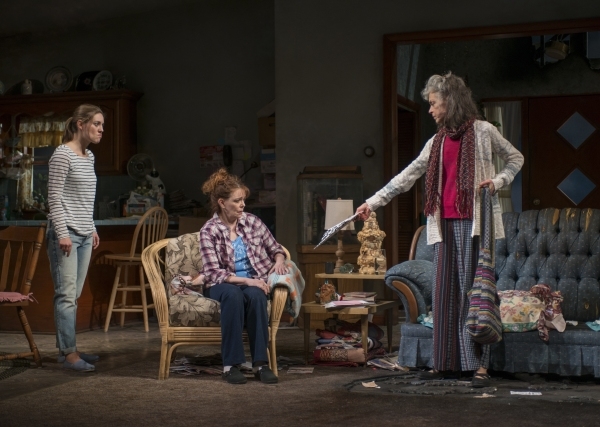The Way West

(© Michael Brosilow)
According to the myth of the American West, there's no obstacle that can't be overcome by a can-do spirit of optimism and rugged individualism. Unflagging perseverance defined the dream of Manifest Destiny and sent pioneers sallying forth into a hostile wilderness. But is that hearty all-American attitude of fortitude enough to triumph in a post-pioneer world? Can pioneer spirit win out when the enemies aren't wild coyotes and jagged mountains but towering credit card debt and an economy mired in recession?
For the unnamed matriarch at the center of the Steppenwolf Theatre's production of Mona Mansour's The Way West, the answer is a staunch, inarguable "yes." There is no 21st century problem that can't be righted by applying a bit of 19th-century gumption. "Strong people punch through," Mom (Deirdre O'Connell) admonishes her adult children. "I may break both legs before I get to the other side, but I will come through it." Never mind that the admonishment comes at the end of a story involving a stranded settler who eventually winds up crippled in the desert. Or that Mom is living in a state that's based more in deluded denial than plucky self-reliance.
Mom is at the heart of Mansour's self-consciously quirky drama. The Way West often plays as a comedy, but tragedy lies in the real world outside Mom's repertoire of quaint prairie parables. Mom's circumstances haven't yet reached Donner Party levels of desperation. But as she and her daughters Meesh (Caroline Neff) and Manda (Zoe Perry) careen from catastrophe to catastrophe, their situation becomes as dire as a wagon train that finds itself out of water midway across the Mojave.
By juxtaposing a contemporary family's woes against those of their pioneering predecessors, Mansour broaches an intriguing exploration of just what constitutes failure and success. Some folks simply weren't cut out for the hardships of the trail, Mom shrugs with grim pragmatism. The DNA of her stock, however, is strong — she and her kin would have thrived in the olden days and will thrive in the present. So what if she's declaring bankruptcy? She will endure, insists Mom; she's got grit.
But Mom's unbending insistence that all will be well seems more like delusion and less like reality as The Way West journeys on. For mom and her daughters, that journey is an epic of serial misfortunes: Fires, jackals, job losses, and the sudden onset of bodily paralysis comprise but a fraction of the woes that rain down on Mom and kin. Not to worry, Mom exclaims. Never mind that the electricity's been cut off, they've been blacklisted by Domino's, and Meesh is possibly looking at felony charges for hawking dubious wares on Etsy. They are not, Mom reiterates, the sort of people who die on the trail. By picking up their guitars and breaking into a campfire song of heroic cowboys and sturdy settlers, Meesh and Amanda chime in with a musical chorus to Mom's mythmaking.
While The Way West isn't a play about bankruptcy, Mansour presents a thought-provoking narrative about the road to insolvency. Mom's money problems are rooted in her desire to be a good person and in her convictions about generosity, decency, and neighborliness. After losing $12,000 by funding a naïve friend's investment in the modern-day equivalent of snake oil, Mom retorts that being generous "is a good way to be." The idea that self-interest and generosity can be incompatible is a troubling one. To her credit, Mansour doesn't attempt to resolve the issue; she simply leaves it for the audience to ponder.
But while it is occasionally thought-provoking, The Way West isn't a play that sweeps you away. Much of the problem lies in the musical interludes and Mom's yarns about the way the West was won. These interruptions create a sense of disconnect: When Amanda and Meesh sing, they essentially stop being Amanda and Meesh and start being a musical representation of the problems that plague them. It's easy to empathize with the women as characters. It's not easy to do so when they morph into strumming songstress commentators on their characters. Mom's colorful history lessons have the same problem. When she steps into a spotlight to tell a story, she steps out of the story that she's in herself.
Directed by Steppenwolf company member Amy Morton, the production boasts a strong ensemble doing its best to sell a play that meanders off the trail of compelling drama. In addition to the outbursts of post-modern cowboy songs is Morton's surreal staging. When the stories and the singing start, a spotlight hit the actors and Mom's ramshackle living room vanishes in a wash of sepia-toned video images of covered wagons and scenic vistas. The effect is jarring. One moment you're immersed in an immediate, resonant story of hardship and struggle. The next, you're in a nostalgic western fantasy.
In the end, not even Steppenwolf's solid cast is quite enough to save The Way West. The heart of the piece becomes lost in a wilderness.










